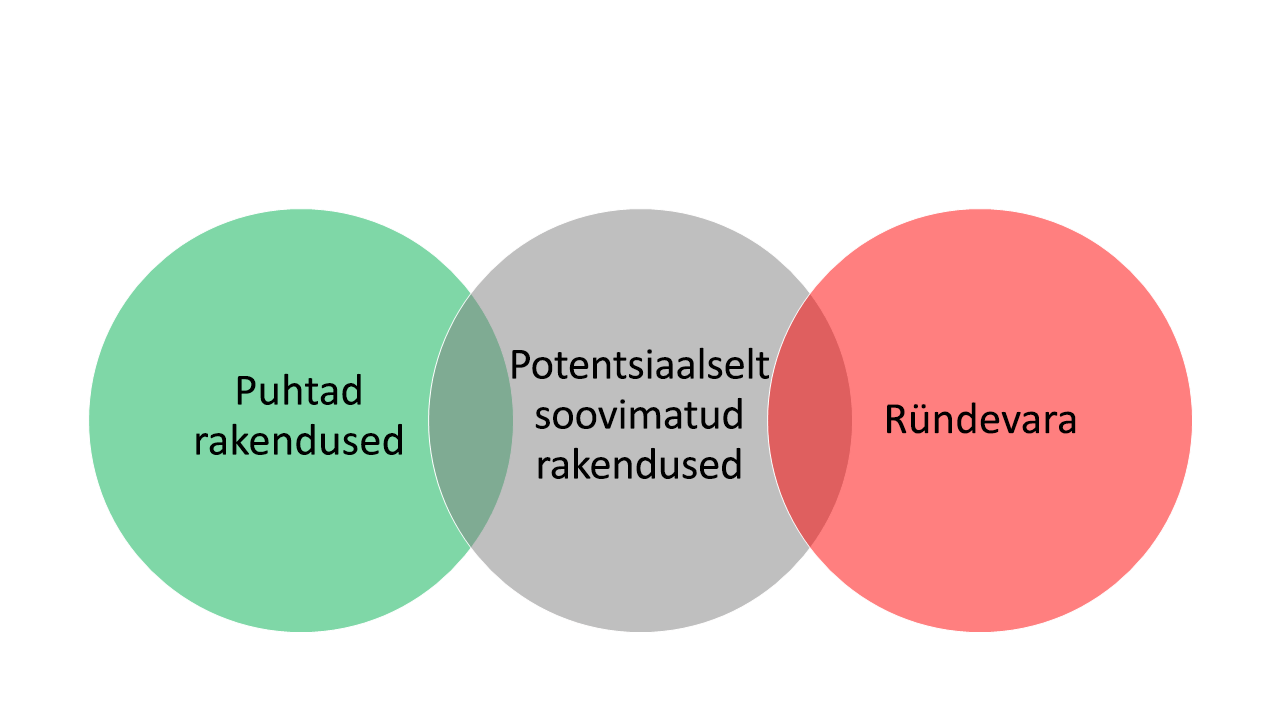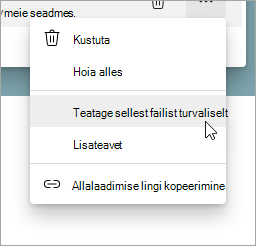Tarkvara spektris on ühes otsas puhtad rakendused, teisel pool ründevara ja hall ala rakenduste vahel, mille suhtes meil pole palju usaldust või mis võivad kuvada häirivat käitumist, kuid mis ei lange ründevara tasemele. Nimetame seda tarkvara hallis alas "Potentsiaalselt soovimatud rakendused" või "PUA".

Malware is malicious software. Tegemist võib olla ise paljuneva viirusega, trooja hobusega, mis teeskleb, et see pole selleks, et teid selle installimisel petta, või muud tüüpi rünnakut. Selle eesmärk võib olla teie isikuandmete varastamine, identiteedi varastamine, süsteemi kasutamine teiste vastu suunatud rünnakute käivitamiseks või muude küberkuritegevuse toimepanemiseks. Microsoft Defenderi viirusetõrje proovib blokeerida ründevara, enne kui see saab teie seadet nakatada.
Potentsiaalselt soovimatud rakendused (PUA) ei ole ründevara, kuid võivad kuvada soovimatuid reklaame, salaja kasutada teie arvutit krüptimise jaoks, pakkuda muid ootamatuid rakendusi või teha muid asju, mida te ei soovi.
Potentsiaalselt soovimatute rakenduste korral Windows teile teada, et meil on probleeme, ja saate otsustada, kas soovite neid installida või mitte. Lisateavet potentsiaalselt soovimatute rakenduste eest kaitse sisseldmise kohta leiate teemast Arvuti kaitsmine potentsiaalselt soovimatute rakenduste eest.
Lisateave
Lisateavet selle kohta, kuidas Microsoft ründevara, soovimatut tarkvara ja potentsiaalselt soovimatuid rakendusi liigitab, leiate teemast Ründevara ja potentsiaalselt soovimatute rakenduste tuvastamine Microsoftis.
Soovimatu tarkvara saamine vähendab võimalusi
-
Laadige alla ainult usaldusväärsetest allikatest (nt Microsoft Store ja olge tähelepanelik selle üle, milliseid rakendusi installite).
-
Veenduge, et kasutate regulaarselt värskendatud viirusetõrjetoodet (nt Microsoft Defenderi viirusetõrje, mis on sisse ehitatud kõigisse Windows.
-
Kasutage kaasaegset brauserit (nt uut brauserit Microsoft Edge. Microsoft Edge kasutab Microsoft Defender SmartScreen, mis aitab blokeerida potentsiaalselt soovimatud rakendused.
-
Hoidke oma seade ajas, kus on uusimad värskendused Windows, brauseri ja rakenduste jaoks.
Näpunäide.: Taaskäivitage arvuti vähemalt kord nädalas. See aitab seda sujuvamalt käitada ja tagada, et uusimad värskendused installitakse regulaarselt.
Kui arvate, et teil on juba soovimatu tarkvara
-
Desinstallige tarkvara, mida te ei vaja Sätted> rakenduste> rakenduste &(programmide lisamine või eemaldamine varasemates Windows versioonides).
-
Kui Windowsi turve,saate uusima turbeteabe ja seejärel käivitage täielik kontroll Microsoft Defenderi viirusetõrje. Lisateave
-
Kui soovimatu tarkvara ei lahene, saate failid Microsoftile edastada.
-
Võrguühenduseta skannimine on võrguühenduseta Microsoft Defender.
Kui olete ettevõttes, lugege Microsofti turbeanalüüs teavet soovimatu tarkvara kohta.
Teatage allalaaditavast failist, mis on teie arvates valesti lipuga märgitud
Kui proovite faili alla laadida Microsoft Edge, võidakse kuvada teade selle kohta, et Edge peab faili pahatahtlikuks või PUA-ks. Kui olete kindel, et fail on turvaline, võib see teatis olla "valepositiivseks". Saate sellest meile teatada, et saaksime seda faili vaadata ja kinnitada, kas see on turvaline ja seda ei tohiks tulevikus blokeerida.
Valepositiivsest teatest teada andmiseks valige allalaadimisteatise kõrval kolm dots ja valige kuvatavas menüüs käsk Teata sellest failist turvalisena.












